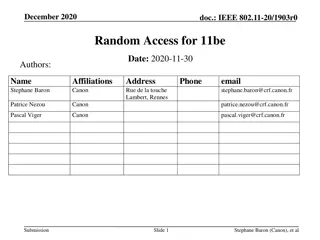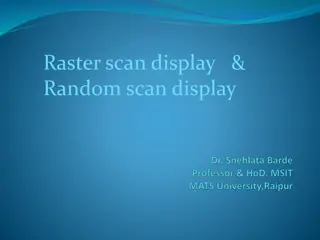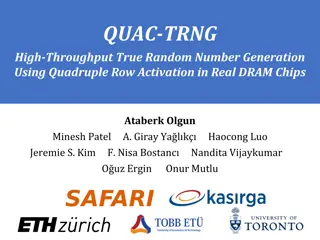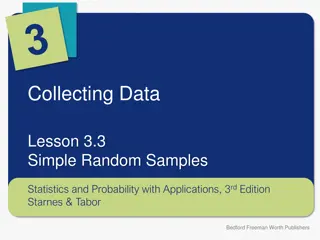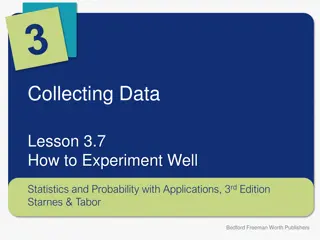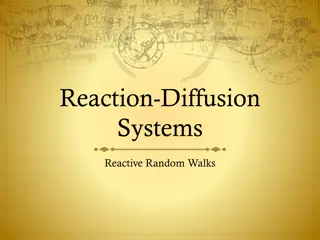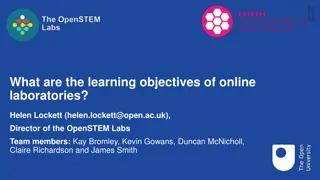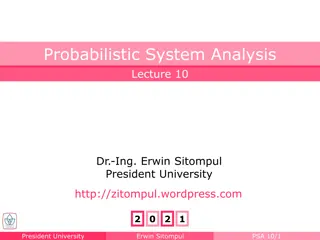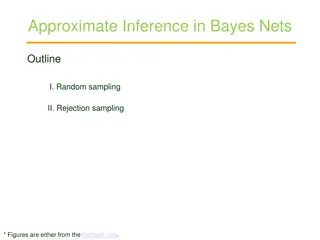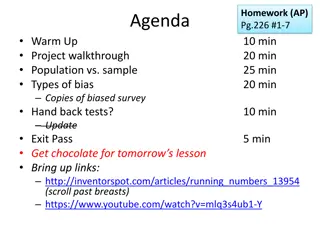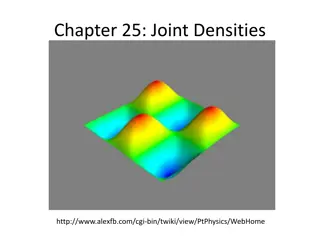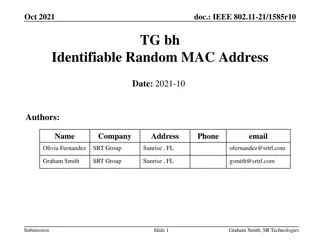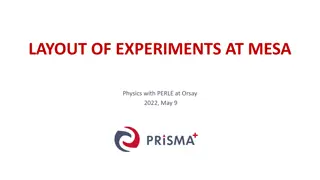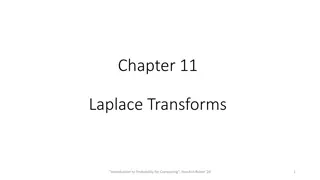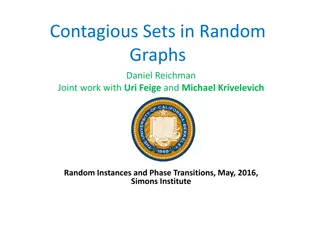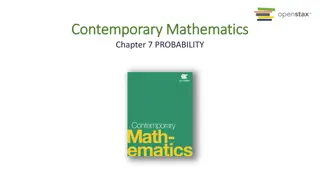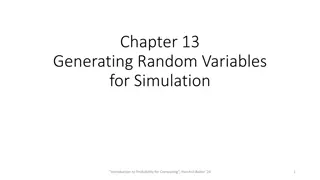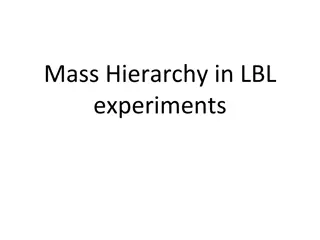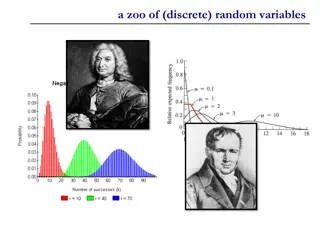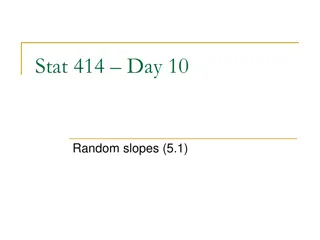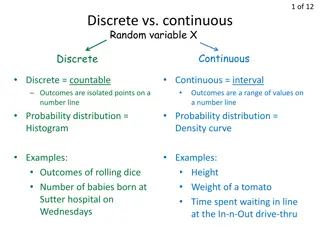Proposal for Random Access Efficiency Enhancement in IEEE 802.11be Networks
This document presents a proposal for enhancing random access efficiency in IEEE 802.11be networks through a Random-Access NFRP (RA-NFRP) principle. The proposal addresses the challenges of low efficiency in the current UORA procedure and introduces modifications based on the 802.11ax standard to im
5 views • 16 slides
Understanding Bluetooth Low Energy Addresses in IEEE 802.11-21/1535r0
The document explores the features of resolvable addresses in Bluetooth Low Energy (BLE) within the IEEE 802.11-21/1535r0 standard. It discusses the two types of addresses in BLE, Public and Random, and their usage. The emphasis is on Random addresses due to their popularity and privacy features. Th
2 views • 11 slides
Understanding Raster Scan Display and Random Scan Display Techniques
Raster scan display involves the electron beam moving along the screen in a systematic pattern to create an image, while random scan display directly draws pictures in any order. Raster scan is commonly used in devices like TVs and monitors, providing high color accuracy but may have lower resolutio
0 views • 9 slides
Understanding Polymer Degradation Processes in Chemistry
Polymer degradation involves a reduction in molecular weight due to various factors like heating, mechanical stresses, radiation, oxygen, and moisture. Two main types of degradation include chain end degradation and random degradation, each affecting the polymer structure differently. Chain end degr
0 views • 12 slides
Understanding Quasi-Experiments in Research
Quasi-experiments are research studies that resemble experiments but do not involve random assignment of participants to treatment groups. This approach is taken when random assignment is challenging or when ethical considerations come into play. Unlike true experiments, quasi-experiments can provid
0 views • 15 slides
Understanding Random Forests: A Comprehensive Overview
Random Forests, a popular ensemble learning technique, utilize the wisdom of the crowd and diversification to improve prediction accuracy. This method involves building multiple decision trees in randomly selected subspaces of the feature space. By combining the predictions of these trees through a
1 views • 21 slides
Simplifying Random Assignment with The Cambridge Randomizer
The Cambridge Randomizer offers a cost-effective and efficient solution for random assignment in research studies, enabling treatment providers to conduct the process securely. This innovative online portal streamlines the assessment of participant eligibility, provides instant baseline data, and en
0 views • 8 slides
High-Throughput True Random Number Generation Using QUAC-TRNG
DRAM-based QUAC-TRNG provides high-throughput and low-latency true random number generation by utilizing commodity DRAM devices. By employing Quadruple Row Activation (QUAC), this method outperforms existing TRNGs, achieving a 15.08x improvement in throughput and passing all 15 NIST randomness tests
0 views • 10 slides
Understanding Simple Random Samples in Statistics
In this lesson, you will learn how to obtain a simple random sample using slips of paper or technology, understand sampling variability and the impact of sample size, and use simulations to test claims about population proportions. The concept of Simple Random Sample (SRS) is explained, where every
0 views • 18 slides
Understanding Random Variables and Their Applications in Various Fields
Random variables play a crucial role in statistics, engineering, and business applications. They can be discrete or continuous, depending on the nature of the outcomes. Discrete random variables have countable values, while continuous random variables can take on any real number. This article explor
0 views • 6 slides
Understanding Random Assignment in Experiments
Explore the importance of random assignment in conducting experiments effectively. Learn how to assign treatments randomly using methods like slips of paper or technology, ensuring equivalent groups and minimizing confounding variables. Discover the significance of random assignment in maintaining r
0 views • 11 slides
Understanding Random Variables and Probability Distributions
Random variables are variables whose values are unknown and can be discrete or continuous. Probability distributions provide the likelihood of outcomes in a random experiment. Learn how random variables are used in quantifying outcomes and differentiating from algebraic variables. Explore types of r
0 views • 13 slides
Advanced Fission Experiments at University of Michigan
The University of Michigan, under the guidance of Dr. Sara A. Pozzi, conducts cutting-edge fission experiments leveraging organic scintillation detectors. These detectors offer advantages such as nanosecond-scale response times, energy proportionality, and scalability. The experiments focus on impro
0 views • 4 slides
Understanding PageRank and Random Surfer Model
Explore the concepts of PageRank and the Random Surfer Model through the importance of web pages, recursive equations, transition matrices, and probability distributions. Learn how page importance is determined by links from other important pages and how random surfers navigate the web.
10 views • 48 slides
Advanced Imputation Methods for Missing Prices in PPI Survey
Explore the innovative techniques for handling missing prices in the Producer Price Index (PPI) survey conducted by the U.S. Bureau of Labor Statistics. The article delves into different imputation methods such as Cell Mean Imputation, Random Forest, Amelia, MICE Predictive Mean Matching, MI Predict
0 views • 22 slides
Exploring Reaction-Diffusion Systems and Random Walks in Chemistry
Delve into the fascinating world of reaction-diffusion systems and random walks in chemistry, exploring concepts such as well-mixed reactive systems, diffusion-reaction dynamics, finite differences, and incorporating reactions into random walks. Discover how these principles play a crucial role in u
0 views • 29 slides
Understanding the Objectives of Online Laboratories in STEM Education
Online laboratories offer interactive experiments over the internet, providing remote and virtual practical experiences in STEM education. The OpenSTEM Labs project aims to explore various activities and outcomes in experiments, focusing on classification schemes and learning objectives. The purpose
0 views • 17 slides
Understanding Random Class in Java Programming
The Random class in Java is used to generate pseudo-random numbers. By utilizing methods such as nextInt and nextDouble, you can generate random integers and real numbers within specified ranges. This chapter explores common usage scenarios, such as generating random numbers between specific ranges
2 views • 10 slides
Understanding Random Sampling in Probabilistic System Analysis
In the field of statistical inference, random sampling plays a crucial role in drawing conclusions about populations based on representative samples. This lecture by Dr. Erwin Sitompul at President University delves into the concepts of sampling distributions, unbiased sampling procedures, and impor
0 views • 23 slides
Quantum Key Agreements and Random Oracles
This academic paper explores the impossibility of achieving key agreements using quantum random oracles, discussing the challenges and limitations in quantum communication, cryptographic protocols, quantum computation, and classical communication. The study delves into the implications of quantum ra
0 views • 29 slides
Approximate Inference in Bayes Nets: Random vs. Rejection Sampling
Approximate inference methods in Bayes nets, such as random and rejection sampling, utilize Monte Carlo algorithms for stochastic sampling to estimate complex probabilities. Random sampling involves sampling in topological order, while rejection sampling generates samples from hard-to-sample distrib
0 views • 9 slides
Understanding Experimental Design and Bias in Statistics
Explore key concepts in statistics such as observational studies, experiments, bias, and sampling methods. Delve into the difference between observational studies and experiments, understand the impact of bias in research, and learn about sampling techniques like simple random sampling and stratifie
0 views • 22 slides
Microbiology Laboratory Experiments Overview
This overview showcases various microbiology laboratory experiments conducted to examine the physiology of bacteria, enzymatic activities, and biochemical reactions. It includes experiments on Phenol Red Dextrose Broth, Phenol Red Lactose Broth, Nitrate Broth, Tryptone Broth, and more. The provided
0 views • 26 slides
Understanding Joint Densities and Probability for Continuous Random Variables
Explore the concepts of joint densities and probability for continuous random variables through examples like meeting times, electrical components' lifetimes, and marginal densities in various scenarios. Learn to calculate probabilities, verify density functions, find joint CDFs, and analyze random
0 views • 18 slides
The Effectiveness of Random Testing for Android
The study explores the effectiveness of random testing tools for Android applications, with Monkey showing the highest coverage level among various tools tested. Monkey's event distribution and inquiries regarding its strategies and coverage analysis are detailed, affirming its effectiveness in stre
0 views • 18 slides
Understanding Random Numbers in Computers
Explore the concept of true random numbers versus pseudorandom numbers in computers. Learn how pseudorandom numbers are generated algorithmically but predictable, while true random numbers are derived from physical phenomena like radioactive decay. Discover the relevance of high-entropy pseudorandom
0 views • 57 slides
IEEE 802.11-21/1585r10: Identifiable Random MAC Address Presentation Summary
This presentation discusses the concept of Identifiable Random MAC (IRM) addresses in the IEEE 802.11-21/1585r10 standard. It covers the purpose of IRM addresses in preventing third-party tracking while allowing trusted parties to identify specific devices. The presentation outlines the use of Ident
0 views • 24 slides
Latest Developments in Physics Experiments at MESA Orsay 2022
Developments at MESA include the layout of experiments, status of the 5 MeV Injector, operational modes, fixed target experiments, challenges in the EB-Experiment P2, procurement updates, energy recovery mode in MAGIX, and upcoming spectrometer deliveries. Exciting advancements and projects are unde
0 views • 16 slides
Understanding Random Variables and Probability Distributions
Random variables play a crucial role in statistics, representing outcomes of chance events. This content delves into discrete and continuous random variables, probability distributions, notation, and examples. It highlights how these concepts are used to analyze data and make predictions, emphasizin
0 views • 25 slides
Understanding Laplace Transforms for Continuous Random Variables
The Laplace transform is introduced as a generating function for common continuous random variables, complementing the z-transform for discrete ones. By using the Laplace transform, complex evaluations become simplified, making it easy to analyze different types of transforms. The transform of a con
0 views • 17 slides
Analysis of Contagious Sets in Random Graphs
The research delves into the concept of contagious sets in random graphs, focusing on bootstrap percolation, random activation, historical perspectives, recent developments, and NP-hard problems. It explores factors like the size of contagious sets, speed of activation, and open problems in the fiel
0 views • 31 slides
Understanding Multi-Stage Probability Experiments
Explore single-stage and multi-stage probability experiments in contemporary mathematics. Learn how to determine sample spaces of experiments using tree diagrams, tables, and outcomes. Discover the concepts of independence and dependence between stages in multi-stage experiments through practical ex
0 views • 18 slides
Generating Random Variables Using Inverse Transform Method
Explore the Inverse Transform Method for generating random variables in simulations. Learn how to map random instances to desired distributions, whether continuous or discrete, by understanding cumulative distribution functions and inverting them. Examples and step-by-step explanations provided for
0 views • 24 slides
Insights into Mass Hierarchy Determination in Long-Baseline Neutrino Experiments
Combining appearance probabilities of electron and anti-electron neutrinos in long-baseline experiments can help determine the mass hierarchy, with ongoing experiments collecting significant data by 2020. Analyses point to CP violation possibilities, with updates expected in Neutrino2016. The capabi
0 views • 6 slides
Understanding Discrete Random Variables and Variance Relationships
Explore the concepts of independence in random variables, shifting variances, and facts about variance in the context of discrete random variables. Learn about key relationships such as Var(X + Y) = Var(X) + Var(Y) and discover common patterns in the Discrete Random Variable Zoo. Embrace the goal of
0 views • 27 slides
Steps to Success: Conducting Scientific Experiments
Scientific experiments play a crucial role in discovering new things. Follow a specific order of steps outlined in the guide to successfully conduct experiments. Begin by understanding biological phenomena, formulating hypotheses, planning, performing experiments, observing results, and drawing conc
0 views • 29 slides
GUC-Secure Commitments via Random Oracles: New Findings
Exploring the feasibility of GUC-secure commitments using global random oracles, this research delves into the differences between local and global random oracles, outlining motivations and future work. It discusses UC frameworks, zero-knowledge proofs, oblivious transfers, and the GUC framework for
0 views • 18 slides
Understanding a Zoo of Discrete Random Variables
Discrete random variables play a crucial role in probability theory and statistics. This content explores three key types: Bernoulli random variable, binomial random variable, and error-correcting codes. From understanding the basics of Bernoulli trials to exploring the application of error correcti
0 views • 27 slides
Understanding Random Slopes in Data Analysis
Exploring the impact of grand-mean and group-mean centering on intercept interpretation with random slopes, as well as variations in slope/intercept covariance. Differentiating between fixed and random coefficients, and the effects of adding group mean as a Level 2 variable. Delving into within vs.
0 views • 21 slides
Understanding Random Variables and Mean in Statistics
Random variables can be discrete or continuous, with outcomes represented as isolated points or intervals. The Law of Large Numbers shows how the mean of observed values approaches the population mean as the number of trials increases. Calculating the mean of a random variable involves finding the e
0 views • 13 slides
